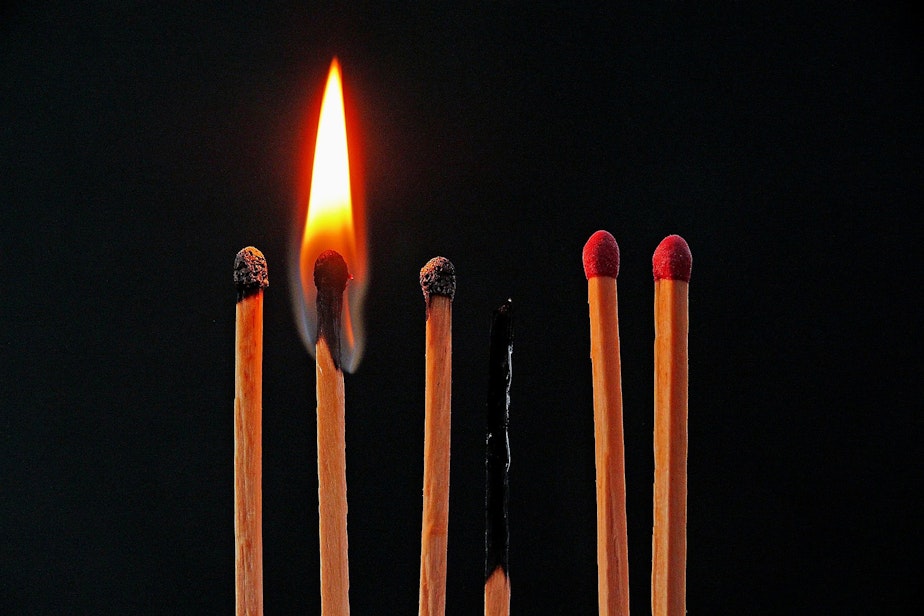'The Burnout Generation': Millennials And The Mindset Of 'Working All The Time'

With Meghna Chakrabarti
Debt, uncertain work, unrealistic expectations — are millennials turning into the burnout generation?
Guests
Anne Helen Petersen, senior culture writer for BuzzFeed News. (@annehelen)
Tiana Clark, poet and professor of creative writing at Southern Illinois University at Edwardsville. She wrote the BuzzFeed article titled “This Is What Black Burnout Feels Like” in response to Anne’s piece on millennial burnout. Author of, “I Can’t Talk About the Trees Without the Blood.” (@TianaClarkPoet)
Sponsored
From The Reading List
Buzzfeed News: “How Millennials Became The Burnout Generation” — “For the past two years, I’ve refused cautions — from editors, from family, from peers — that I might be edging into burnout. To my mind, burnout was something aid workers, or high-powered lawyers, or investigative journalists dealt with. It was something that could be treated with a week on the beach. I was still working, still getting other stuff done — of course I wasn’t burned out.
“But the more I tried to figure out my errand paralysis, the more the actual parameters of burnout began to reveal themselves. Burnout and the behaviors and weight that accompany it aren’t, in fact, something we can cure by going on vacation. It’s not limited to workers in acutely high-stress environments. And it’s not a temporary affliction: It’s the millennial condition. It’s our base temperature. It’s our background music. It’s the way things are. It’s our lives.
“That realization recast my recent struggles: Why can’t I get this mundane stuff done? Because I’m burned out. Why am I burned out? Because I’ve internalized the idea that I should be working all the time. Why have I internalized that idea? Because everything and everyone in my life has reinforced it — explicitly and implicitly — since I was young. Life has always been hard, but many millennials are unequipped to deal with the particular ways in which it’s become hard for us.”
Buzzfeed News: “This Is What Black Burnout Feels Like” — “The truth is, I don’t feel like I am allowed to be tired.
Sponsored
“My great-great-grandmother, Freelove, named after her mother’s master, was a single parent with twelve children in Lenoir, North Carolina. During the Great Depression, she cultivated a farm in her backyard so that her children wouldn’t starve. Everyone called her ‘Boss,’ because of her rigid rules and demeanor, and my grandmother and mother were no different. I come from a long line of strong, stern, single women who did not have the luxury of ghosting on their responsibilities — if they did, people would die or suffer greatly. No breaks. No time to play. No helicopter parenting. Providing basic survival needs was the currency of black love in my family.
“I enjoyed a large chunk of Anne Helen Petersen’s viral millennial burnout article and its attempt to define our current anxieties and stasis, but it wasn’t a mirror in which I saw myself reflected. An article about burnout that discussed the feelings and behaviors of a generation — my generation — didn’t include my dead black batteries.
“Yes, we are all so damn tired and in debt, but that pain and exploitation are stratified across various identities, which is why we need more diverse voices in this conversation. I’m glad to see there was a broader follow-up to Petersen’s point of view. I understand that one article can’t speak for us all. Because for me, black burnout is different.”
Slate: “Burnout Isn’t Just a Millennial Affliction” — “For stretches of my adulthood, I have self-soothed by forgoing cooking dinner in favor of eating an entire bag of flavored kettle chips. Perhaps unsurprisingly, Anne Helen Petersen’s most recent BuzzFeed piece, ‘How Millennials Became the Burnout Generation,’ resonated with me. Petersen spends the piece detailing why people my age feel so overwhelmed by small to-do list items, like going to the post office or the grocery store: We’re so burned out from trying to endlessly work and fulfill our larger goals, and that we essentially no longer care about the small things that don’t come with a major reward. I shared it on Instagram. I told my roommates to read it. Petersen’s newsletter notes that since its publication on Saturday, millions of people have read it, too.
“But as I turned the piece over in my head and talked about it more, I found myself increasingly skeptical of Petersen’s thesis. Not that burnout isn’t real, but that it’s as inherent to millennials as Petersen claims it to be. As writer Kim O’Connor put it, the essay is ‘somehow too general and too specific at the same time.’ It functions best as a personal essay, but it’s framed as the Rosetta stone to millennial life (perhaps because it’s in part responding to attitudes and trend pieces that also falsely lump millennials together). And yet, she never really delivers compelling evidence explaining why the experience would be unique to millennials, beyond vaguely nodding to the ‘parental optimization and monitoring’ that some millennials were raised under. She ignores the fact that other generations currently experience the same effects of work email in our pockets and shiny lives of our peers on Instagram. She also ignores the fact that people who are not white and not middle class and not able-bodied have suffered the effects of burnout for longer than millennials have even been around (a privileged blind spot that, to her credit, she seems interested in considering more deeply post-publication).” [Copyright 2019 NPR]
